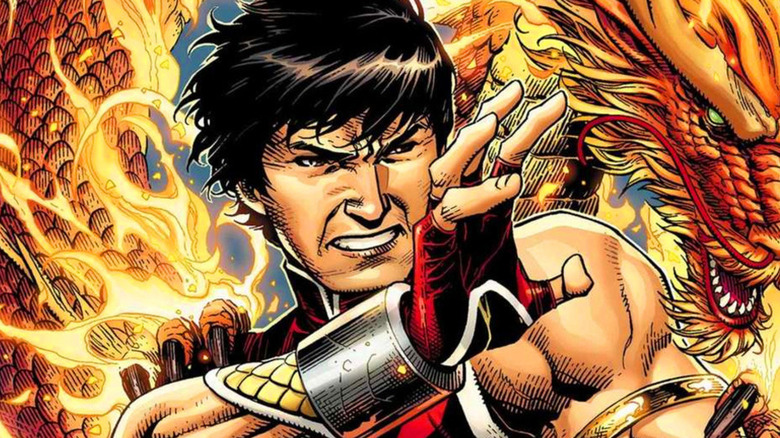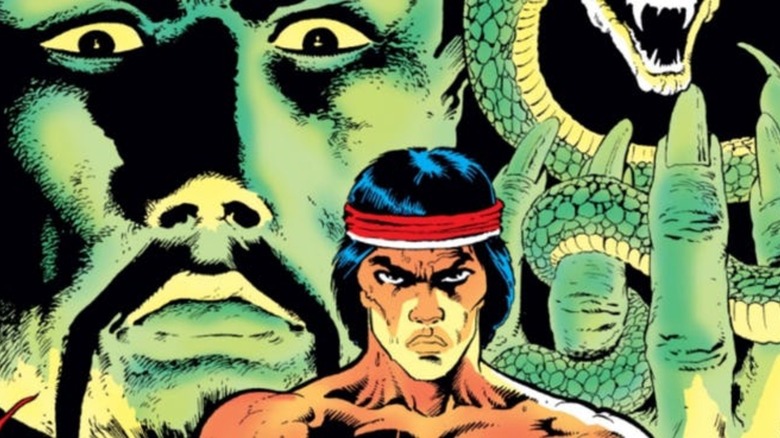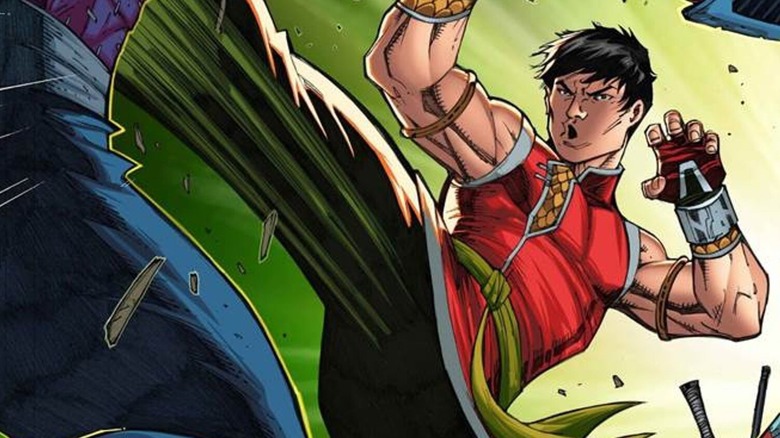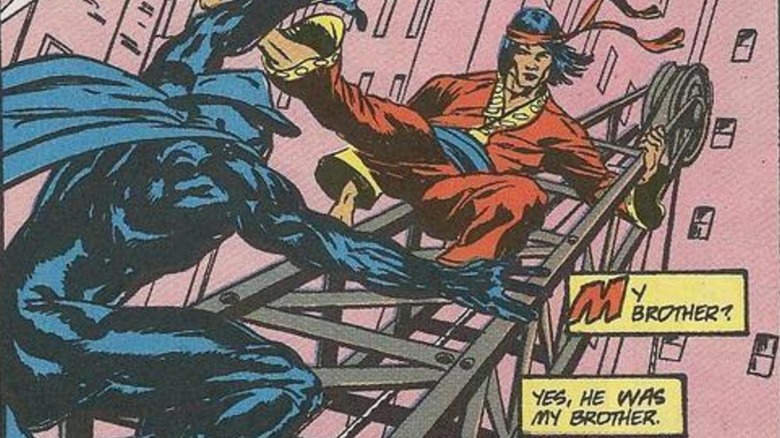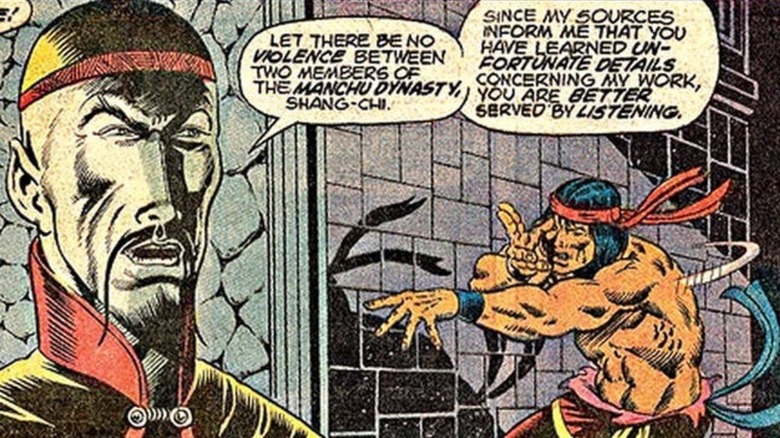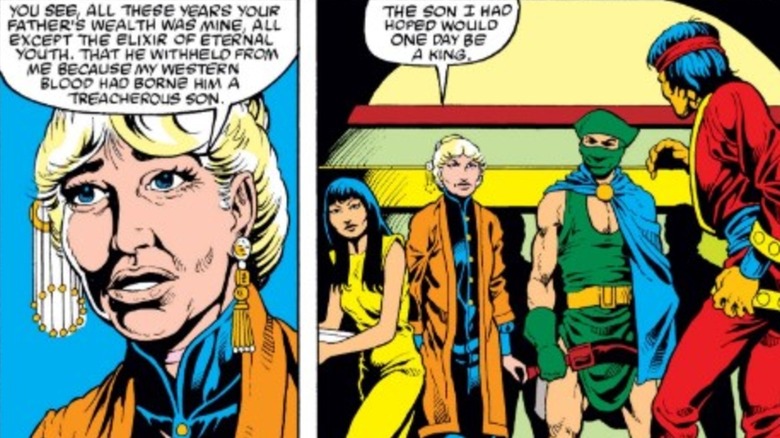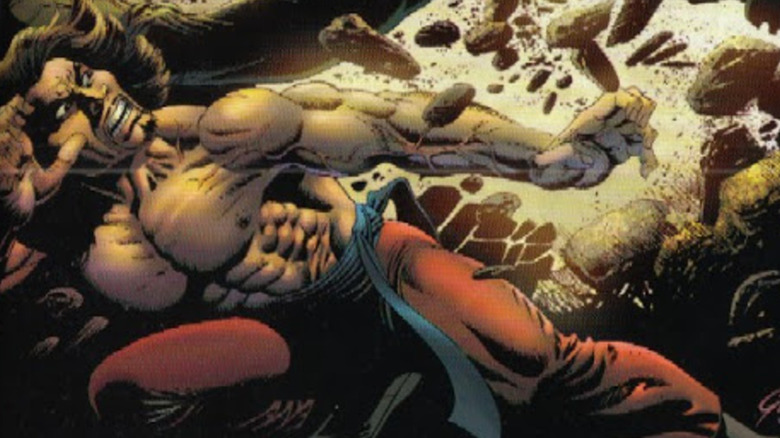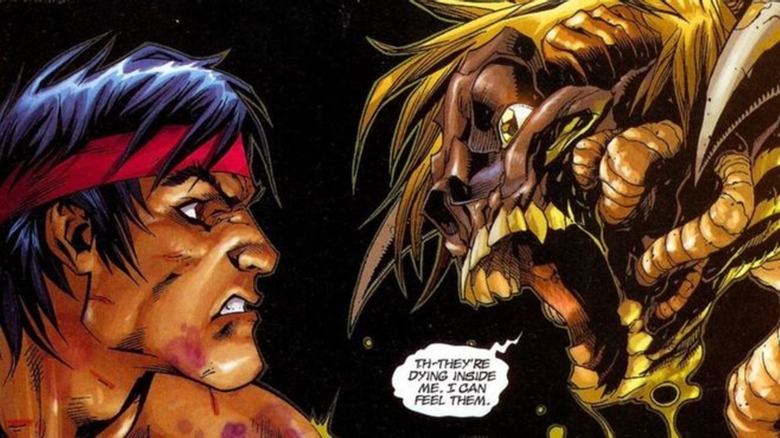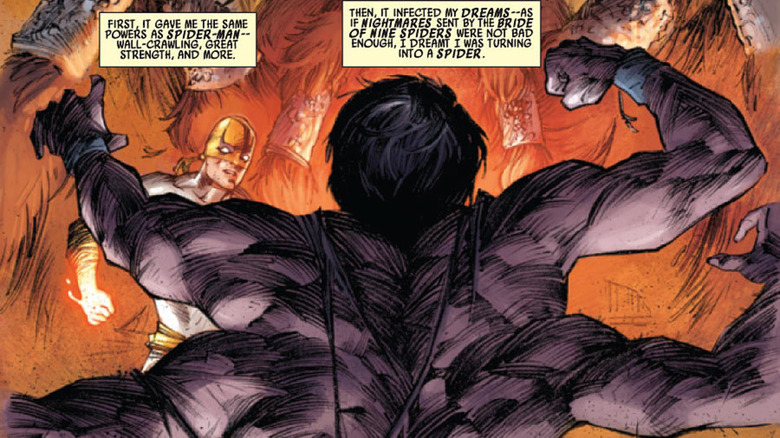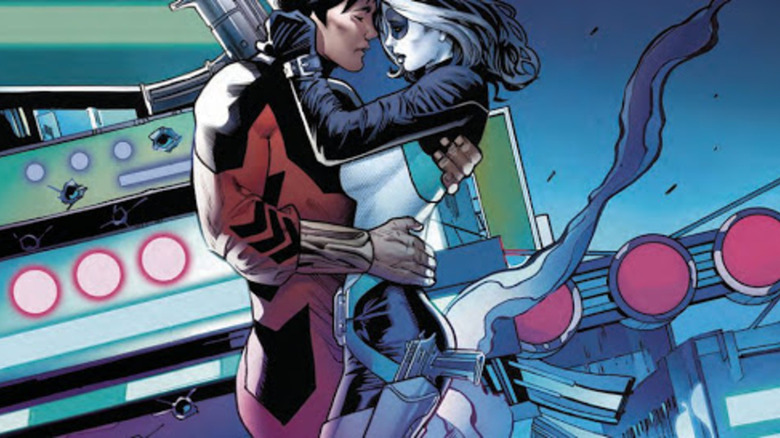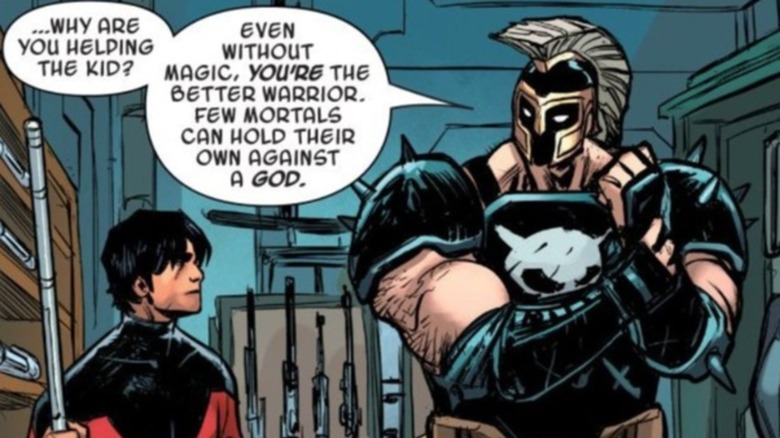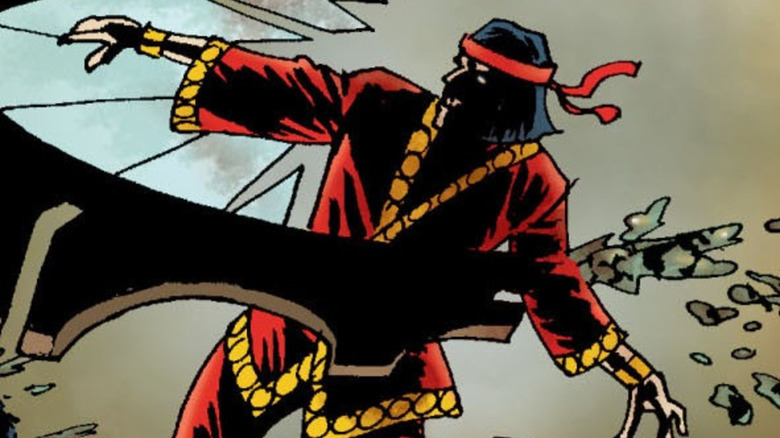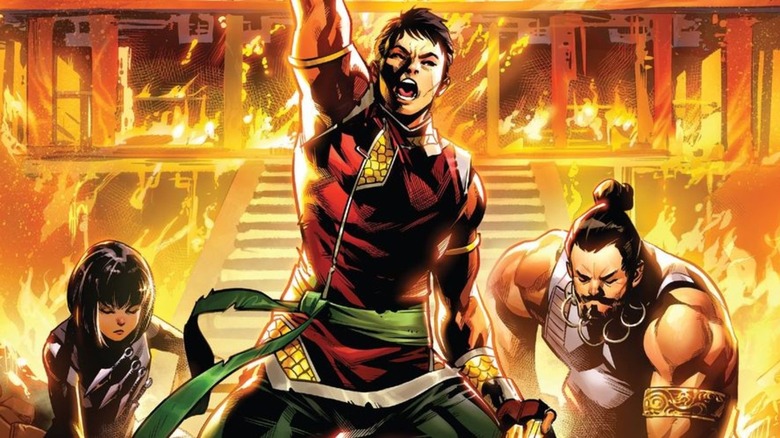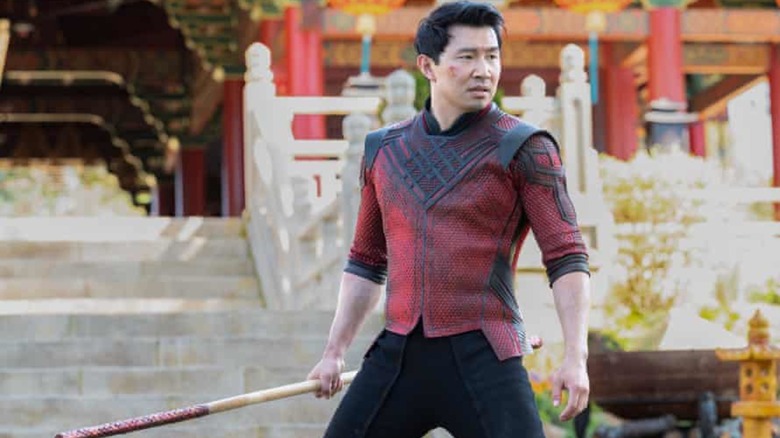The Dark History Of Shang-Chi
The Marvel Cinematic Universe is soon going to introduce Shang-Chi, one of the most prominent characters of color from Marvel Comics. He's set to debut in his own standalone movie that will explore his origins. In the comics, Shang-Chi is generally acknowledged to be one of the greatest non-superpowered heroes, with an unshakeable sense of honor and a desire to help the world using his wushu fighting ability.
Such is the level of combat skill that Shang-Chi possesses that he has acted as a teacher for some of the most popular superheroes in the medium, from Spider-Man to Wolverine. Shang-Chi is also considered a particularly pure-hearted warrior, so much so that Captain America once willingly admitted defeat against him so Shang-Chi would be chosen as the next avatar of the awesome power of the Phoenix Force.
But as well-respected as Shang-Chi is in comic book circles, his history has not always been a smooth one. In fact, Shang-Chi's conception and evolution across Marvel Comics has been mired in controversy and notoriety for one reason after another. Here are some of the darkest moments from the legend of Shang-Chi — aka Brother Hand, Master of Kung Fu.
A troubled road to creation
Those who study Shang-Chi's design from the comics will no doubt notice that the character came to bear more than a passing resemblance to Bruce Lee in later years. This was no coincidence. The character was created by writer Steve Englehart and artist Jim Starlin in 1972 to cash in on the popularity of then-novel kung fu action films.
At first, Marvel Comics attempted to secure the rights to 1972's cult classic show "Kung Fu" to adapt into a comic series. When they failed to get the rights, Marvel acquired the comic book rights to Sax Rohmer's infamous villain Dr. Fu Manchu. Thus, Shang-Chi was initially introduced in Marvel Comics as a previously unknown son of Fu Manchu.
However, Fu Manchu has long been criticized for being a stereotype of the west's notion of the evil East Asian. As such, Shang-Chi's origin as the son of Fu Manchu has garnered a great deal of controversy over the years. Marvel's rights to the character, however, lapsed with the cancellation of "Master of Kung Fu" in the '80s. Later writers got around the issue of not being able to use the name "Fu Manchu" by retconning the name as an alias of Shang-Chi's father, whose real name is Zheng Zu. The upcoming live-action movie will keep to this new lore by having Shang-Chi be the son of Zheng Zu.
Raised to be the perfect assassin
While Shang-Chi is acknowledged to be the one of the most honorable heroes in Marvel Comics, that was not the path he was initially set to follow. In the comics, Shang-Chi was born in the Hunan province of China, where he was trained in all forms of combat from a young age.
At first, Shang-Chi was completely obedient to his father Fu Manchu's wishes, believing him to be a benevolent monarch. Little did Shang-Chi know that his father was secretly one of the great criminal masterminds of the world, who had been training his son to be the perfect assassin and killing machine.
It was only when Shang-Chi took the life of Dr. James Petrie in London as part of his first mission on his father's behalf that he began to be troubled by what he was being asked to do in the name of peace. There Shang-Chi met his father's nemesis, Sir Denis Nayland Smith, who revealed the true nature of his father's evil plans for world domination.
Aghast at the level of betrayal, Shang-Chi turned on his father. He invaded Fu-Manchu's lair and declared they were now enemies. Over the years, Shang-Chi would make good on his promise to his father by foiling his plans for global domination time and again.
Fighting with his family
Shang-Chi was raised to believe in the utmost importance of family and his tribe. Unfortunately, that belief became the bane of his existence once he declared war on his supervillain father and the rest of his criminal family.
First among them was Midnight, Shang-Chi's adopted brother. Although the two were not related by blood, a solid friendship had existed between Midnight and Shang-Chi from an early age. That relationship came to an end once Fu Manchu ordered Midnight to hunt down and execute his rogue brother. Although Shang-Chi pleaded with Midnight to renounce Fu Manchu, the latter continued to fight Shang-Chi to the death.
Just as tragic was the relationship between Shang-Chi and his half-sister, Fah Lo Suee. Although there was no love lost between Fu Manchu and his daughter, her desire to take her father down was far from benevolent. Fah Lo Suee led her own criminal organization, and her plan was to use Shang-Chi to get Fu Manchu out of the way so her own gang could become the most powerful criminal organization in the world. Once again, Shang-Chi was forced to work against his family when he acted against his sister as well as his father.
The death of Fu Manchu
The tragedy of Shang-Chi's entire life has been that while he is deeply committed to peace, it could only be achieved through the death of his once-beloved father, the supervillain Fu Manchu. Or so Shang-Chi believed. To that end, the 1974 comic series "Master of Kung Fu" saw Shang-Chi track down Fu Manchu and leave him for dead in the rubble of a destroyed building.
But the passing of Fu Manchu did not bring Shang-Chi the relief he imagined. After his father's death, Shang-Chi embarked on a quest to save his mother, who he imagined was being held against her will. After a long search, he was able to finally track her down in "Master of Kung Fu #123."
But there Shang-Chi discovered that his mother was no captive at all, but had truly loved Fu Manchu. His mother renounced Shang-Chi for killing his father. The young hero was given the moniker "False son" by his former comrades and mother. The mission that Shang-Chi believed would free the world and his mother of his father's evil failed to be the moment of triumph he'd so desperately hoped for.
Atoning for Fu Manchu's death
As discussed in the previous section, Shang-Chi discovered that taking his evil father's life was a more complicated act than he had imagined. In 1983's "Master of Kung Fu #125," Shang-Chi sought to deal with being disowned by his mother and his own conflicted feelings by engaging in the last rites of his father's funeral.
To fulfill his duties as a son, Shang-Chi returned to Hunan to pay his last respects. Even though he could not bear to call Fu Manchu "honorable father," Shang-Chi nevertheless prayed that his spirit would find peace. But his musings were interrupted by demons both real and imagined. Shang-Chi fled to other parts of China in search of something that would assuage his feelings of guilt.
Finally, after a twilight battle against the ghost of his brother Midnight, Shang-Chi drinks from his father's ceremonial cup and is able to come to terms with his actions to a certain extent. But that acceptance comes at a price, as Shang-Chi renounces his past as a crime fighter and settles down to a simple life of farming and fishing.
The death of Moving Shadow
Shang-Chi's personal history has always been defined by the fact that he is the only child of his supervillain father Fu Manchu who refused to enter into a life of crime. After Shang-Chi refused his father Fu Manchu's orders to work for his criminal empire, Moving Shadow was called upon to take Shang-Chi's place at Fu Manchu's side.
Moving Shadow was yet another half-brother to Shang-Chi, and raised in a similarly brutal fashion to be the perfect killing weapon. But while Shang-Chi eventually came to see his father's evil nature, Moving Shadow was blindly subservient and completely willing to kill his half-brother at their father's behest.
In the 2002 series, "Shang-Chi: Master of Kung Fu," Moving Shadow came face to face with Shang-Chi and tried hard to kill him. No matter how much Shang-Chi exhorted him to see reason, Moving Shadow was single-minded in his desire to kill his brother. In the end, Shang-Chi emerged the victor in their battle, but refused to kill Moving Shadow. But their father had no such qualms. Dismissing Moving Shadow for having failed in his mission, Fu Manchu personally launched a dagger into his heart in front of Shang-Chi.
The murder of an ally
Shang-Chi has a long history of being a part of superhero teams, where his even-tempered nature and top-notch fighting skills are invariably assets. The 2007 series "Heroes for Hire" saw Shang-Chi working alongside a host of allies, including the insect-powered metahuman Humbug.
What made Humbug stand out from the other heroes was the fact that he had once been a Spider-Man villain. Humbug used to be Buchanan Mitty, an entomology professor who tried to turn to a life of crime to fund his research. After constantly being foiled by Spider-Man, Humbug decided to turn good, which is how he came to be a part of the super team Heroes for Hire.
In a 2007 "Heroes for Hire" arc, Humbug gets infected by a supervillain called the Brood Queen. While fighting the influence of the Queen on his mind, Mitty betrays his teammates to the Brood. When Shang-Chi comes to know of this deception against Tarantula, with whom he shares a close relationship, he rips Humbug's head off.
Transforming into an evil spider
One of Shang-Chi's most memorable crossovers occurred with Spider-Man in 2011's "Spider-Island" series. Shang-Chi finds himself infected with something called the "spider virus," which grants him similar abilities to Spider-Man. But along with the powers come a series of disturbing nightmares in which Shang-Chi sees himself transform into a giant spider and attack innocent civilians.
The vision becomes a reality in "Spider Island: Deadly Hands of Kung Fu," when Shang-Chi is called in to help defeat the Bride of Nine Spiders, who is holding Iron Fist captive. After freeing the other hero, Shang-Chi discovers that Bride of Nine Spiders is being controlled by Ai Apaec.
While battling Ai Apaec, Shang-Chi's nightmare comes to pass when the spider virus mutates him into a giant spider-like creature. The spider's instincts threaten to consume Shang-Chi's psyche entirely. But a last-minute assist from Iron Fist reminds the Master of Kung Fu of his true nature, and Shang-Chi is able to revert back to his true form.
When Shang-Chi's student betrayed his trust
Despite his youth, Shang-Chi's fighting skills and serene nature have made him the go-to guy for heroes looking to brush up their skills. One such hero/anti-hero was Domino, who sought Shang-Chi's help to become a better fighter and generally a more even-tempered person.
In 2018's "Domino #4," Shang-Chi and Domino engage in an intense round of sparring. At first Shang-Chi is impatient with Domino's flighty nature, but the two eventually grow closer, even sharing a kiss in a night club. Unfortunately, things come to a head when the date is interrupted by Shang Chi's enemies, on the orders of Domino's enemy, Topaz. Shang-Chi helps Domino recover her lost knowledge of her powers well enough to take on their enemies single-handedly.
Eventually, Domino comes face-to-face with Topaz herself. Despite Shang-Chi's pleas to show mercy, Domino is unable to stop herself from killing her archenemy. Disappointed with his pupil, Shang-Chi dismisses Domino from his tutelage, and their unlikely romantic relationship also ends.
Making a pact with the God of War
Despite his extremely violent upbringing, Shang-Chi has managed to stick to a pretty pacifist path most of the time. But the Master of Kung Fu has strayed from it from time to time, like when he entered into a pact with the literal Greek God War, Ares himself.
In backup stories from "Sword Master," Ares and his legion of Dragonborn soldiers got into a confrontation with Shang-Chi and Sword Master. Ares wanted to get his hands on Shang-chi's ally Lin Lie's mystical Fu Xi sword, with which the God of War intended to kill the kidnapper of his son. Despite the misgivings of Sword Master, Shang-Chi entered into a pact with Ares to aid him with the sword and the retrieval of his son, in return for the God of War's help in finding Lin Lie's missing father.
Rather predictably, the deal soon goes south as Ares, his son and Sword Master are forced into a heated battle against Davi Naka, the Mother Goddess of Madripoor. Although Shang-Chi is able to temporarily placate the Goddess, the actions of his former teammates, the Agents of Atlas, lead to an all-out war between the surface city of Pan and the underwater city of Atlantis.
Becoming a zombie
Comic books frequently use not just one reality, but several alternate timelines that coexist and occasionally overlap. In 2006's five-issue limited series "Marvel Zombies," readers are introduced to an alternate universe where a zombie virus has devastated Earth and turned many of the planet's greatest heroes into mindless zombies.
Unfortunately, Shang-Chi was one of the heroes who had succumbed to the virus. In "Ultimate Fantastic Four #23," we see a pitched battle in the middle of Manhattan as the zombie heroes try to eat the last batch of surviving humans. Ironically, it was an alternate version of Magneto who came in to rescue the humans alongside the Ultimate Fantastic Four. Shang-Chi attempts to fight Ben Grimm, aka Thing, but is sent flying back with a single punch.
To cap it off, when Shang-Chi recovers and attempts to fight Magneto instead, the immensely powerful mutant cuts the Master of Kung Fu in half. The 2009 "Marvel Zombies Return" storyline imagined yet another zombie-infested alternate reality. This time, Shang-Chi came into direct conflict with remnants of the zombie superhero tribe when he was slashed to death by zombie Wolverine in "Marvel Zombies Return: Wolverine."
Taking over his father's role
Even after accomplishing his goal of killing his father and his criminal cohort, Shang-Chi was not rid of Zheng Zu's legacy.
In 2020's "Shang-Chi" series, the Master of Kung Fu discovers that Zheng Zu's spirit chose him to be the next Supreme Commander of the Five Weapons Society. At first, Shang-Chi resists the calling, even after coming into contact with his newly discovered half-siblings, Brother Sabre and Sister Dagger. But eventually, he agrees to team up with his siblings.
Shang-Chi's intention is to rescue his long-lost full sister, Shi-Hua, who is operating as the supervillain Sister Hammer and attempting to take control over the Five Weapons Society. Eventually, Shang-Chi comes to accept that the only way to stop the infighting is to accept his role as the new Supreme Commander of the Five Weapons. Although he vows to turn the society into a force for good, his father's spirit visits him upon his coronation, mockingly telling him, "My throne suits you, my son. For you are destined to become like me. Just. Like. Me."
His life as a crime lord
In 2005, Marvel Comics released a pathbreaking new comic series that detailed the "House of M" storyline. In this reality, the Scarlet Witch had used her reality-warping powers to change the world at a fundamental level. Most of the heroes and villains were affected, and not in a good way.
For Shang-Chi, this temporary alternate timeline formulated a new path in which he never realized his father was an evil crime lord. After his father is killed by Magneto, Shang-Chi vows to get revenge. To accomplish this, he becomes the head of the Dragons criminal organization. Far from being a pacifist, this new version of Shang-Chi and his allies got into frequent skirmishes with other gangs that encroached on their territory.
Fortunately, it soon became clear that this new reality was false, and Shang-Chi and the other gang leaders were able to put their differences aside. The gangs went on to join the Avengers in their battle against the Brotherhood.
Calls to ban the new Shang-Chi movie
All of this decades-long comic history now brings us to the upcoming live-action film, "Shang-Chi and the Legend of the Ten Rings." The MCU offering combines a huge budget with a cast of international stars, and looks set to be another culturally impactful blockbuster along the lines of "Black Panther." But the movie is not without its detractors. Much of the criticism has to do with the main villain Zheng Zhu and his origins as the "yellow peril" stereotype "Fu Manchu."
Much of the criticism comes from China, the country whose culture the movie claims to represent. According to Variety, the reaction of many fans on Chinese social media channels to the trailer for "Shang-Chi and the Legend of the Ten Rings" was far from flattering, with one user commenting, "So you change the name and it's not Fu Manchu anymore? The Mandarin is inherently a character that blackens the image of the Chinese people."
Apart from the views on Zheng Zu, people have also complained that the trailer shows a highly stereotyped view of Chinese culture, replete with Kung Fu, lanterns, pagodas, and Dragon Ladies. For his part, the lead actor Simu Liu has responded to the criticism on Twitter with, "I want to thank all of our Chinese fans for their support and encouragement. To the other people, who are rooting for our failure, I don't have much to say, just wait and see."
